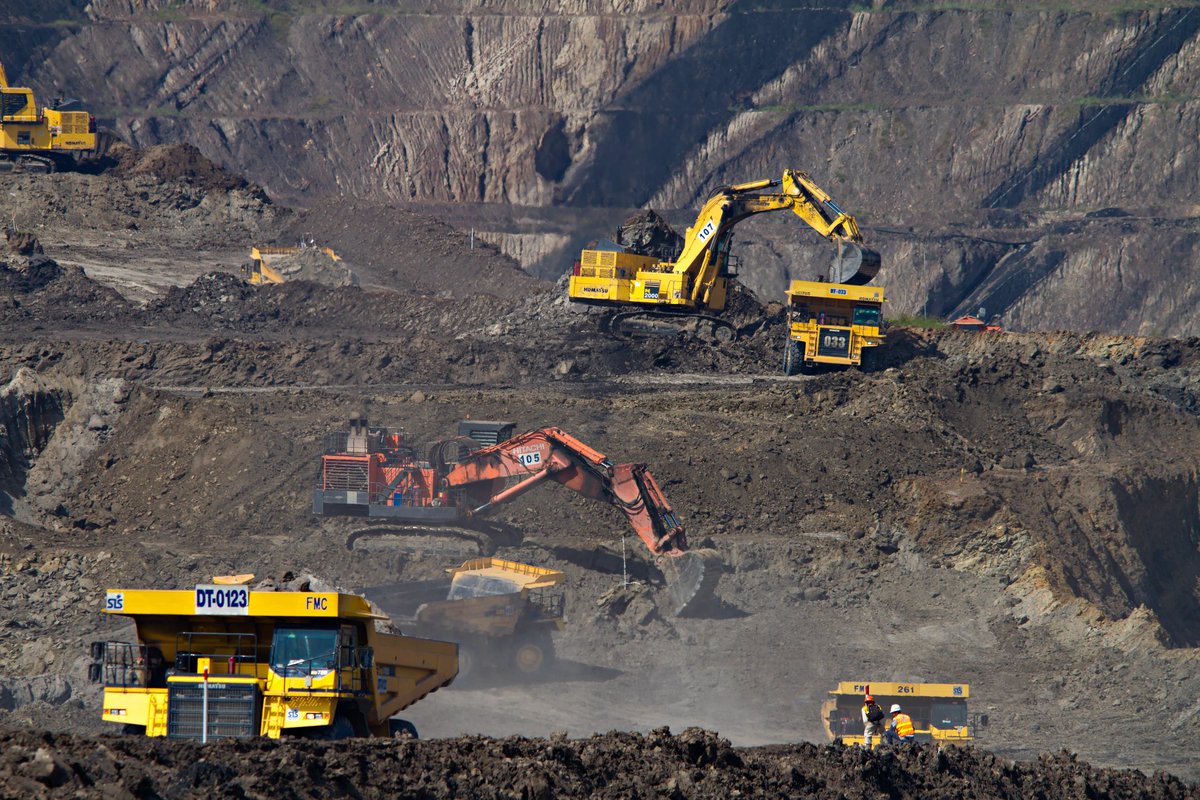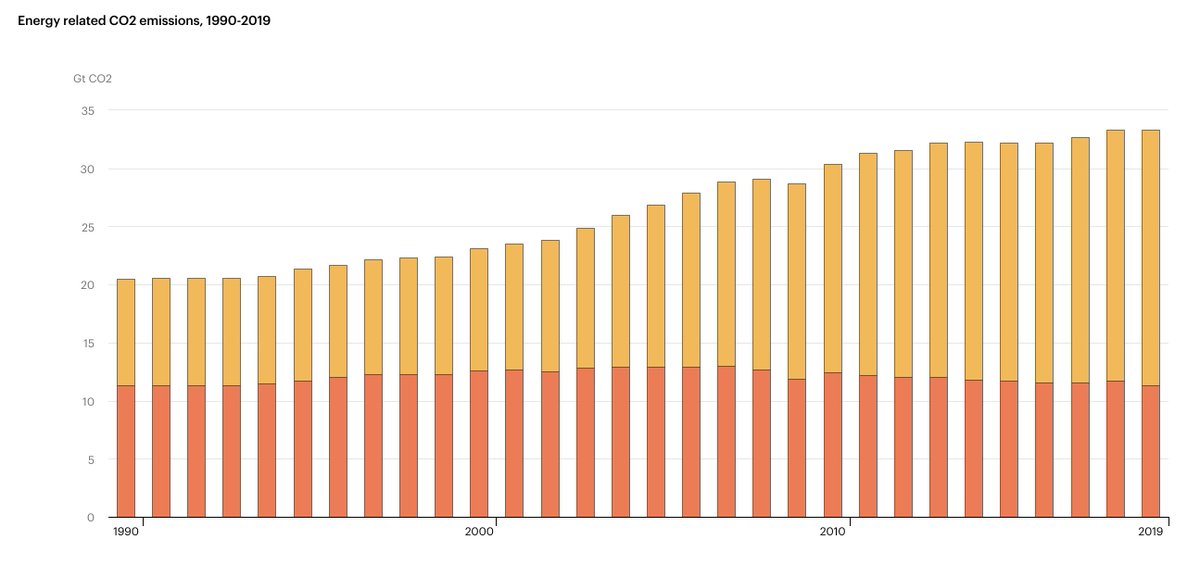Let& #39;s do a small thought experiment:
What would be the current ecological footprint of #Bitcoin https://abs.twimg.com/hashflags... draggable="false" alt=""> mining if we considered the absolutely *worst* possible case? /1
https://abs.twimg.com/hashflags... draggable="false" alt=""> mining if we considered the absolutely *worst* possible case? /1
What would be the current ecological footprint of #Bitcoin
Let& #39;s assume that *all* (i.e. 100%) of the electricity consumed by Bitcoin mining operations were exclusively generated from the *most* polluting energy source available today – brown coal. /2
The emissions intensity of coal-fired power plants can vary significantly across geographies and time, but since we assume the worst case, let& #39;s use figures from a world champion in carbon emissions – the Hazelwood Power Station in Victoria, Australia. /3
Entering service in 1964, Hazelwood gained notoriety as one of the most polluting power stations in the world. It emitted roughly 1.58 tonnes of CO2 per MWh of electricity – about 50% more than the average coal PS.
It was decommissioned in 2017 and subsequently demolished. /4
It was decommissioned in 2017 and subsequently demolished. /4
According to the CBECI, Bitcoin& #39;s annualised electricity consumption stands currently at ± 140 TWh.
Using Hazelwood Power Station& #39;s terrible emissions intensity as a measuring stick, this would amount to approximately 221 Mt (million metric tons) of carbon dioxide emissions. /5
Using Hazelwood Power Station& #39;s terrible emissions intensity as a measuring stick, this would amount to approximately 221 Mt (million metric tons) of carbon dioxide emissions. /5
According to the IEA, global energy-related CO2 emissions flattened in 2019 at around 33 giga tonnes (Gt).
This would mean that the #Bitcoin https://abs.twimg.com/hashflags... draggable="false" alt=""> network alone were responsible for about 0.67% of the world& #39;s total yearly emissions.
https://abs.twimg.com/hashflags... draggable="false" alt=""> network alone were responsible for about 0.67% of the world& #39;s total yearly emissions.
That is a staggering number! /6
This would mean that the #Bitcoin
That is a staggering number! /6
Now, remember that this is just a thought experiment. The absolutely worst imaginable case.
And imaginary it is, indeed: the assumptions have no empirical basis in reality. /7
And imaginary it is, indeed: the assumptions have no empirical basis in reality. /7
We know that:
1) The emissions intensity of the average coal-fired power station is significantly lower than Hazelwood& #39;s
2) Brown coal is but one of the fossil fuels that power grids around the world (others have lower footprints)
/8
1) The emissions intensity of the average coal-fired power station is significantly lower than Hazelwood& #39;s
2) Brown coal is but one of the fossil fuels that power grids around the world (others have lower footprints)
/8
3) Seasonal migration patterns in China (observable through the CBECI mining map!) result in a significant share of Bitcoin mining moving south during the wet season to tap into cheap excess hydro power.
/9
/9
4) A non-trivial share of Bitcoin mining is exclusively powered by renewables, all year long, around the clock. Many of these farms are located in the Nordic countries of Europe, and some operators have embraced carbon neutrality as a competitive advantage.
/10
/10
So where does that leave us?
Reality is not as dark as thought-experiment-land.
Bitcoin undeniably consumes a lot of electricity and generates non-zero emissions. But it is certainly not a " #climate killer" in its current form.
/fin
Reality is not as dark as thought-experiment-land.
Bitcoin undeniably consumes a lot of electricity and generates non-zero emissions. But it is certainly not a " #climate killer" in its current form.
/fin

 Read on Twitter
Read on Twitter mining if we considered the absolutely *worst* possible case? /1" title="Let& #39;s do a small thought experiment:What would be the current ecological footprint of #Bitcoin https://abs.twimg.com/hashflags... draggable="false" alt=""> mining if we considered the absolutely *worst* possible case? /1" class="img-responsive" style="max-width:100%;"/>
mining if we considered the absolutely *worst* possible case? /1" title="Let& #39;s do a small thought experiment:What would be the current ecological footprint of #Bitcoin https://abs.twimg.com/hashflags... draggable="false" alt=""> mining if we considered the absolutely *worst* possible case? /1" class="img-responsive" style="max-width:100%;"/>




 network alone were responsible for about 0.67% of the world& #39;s total yearly emissions.That is a staggering number! /6" title="According to the IEA, global energy-related CO2 emissions flattened in 2019 at around 33 giga tonnes (Gt). This would mean that the #Bitcoin https://abs.twimg.com/hashflags... draggable="false" alt=""> network alone were responsible for about 0.67% of the world& #39;s total yearly emissions.That is a staggering number! /6" class="img-responsive" style="max-width:100%;"/>
network alone were responsible for about 0.67% of the world& #39;s total yearly emissions.That is a staggering number! /6" title="According to the IEA, global energy-related CO2 emissions flattened in 2019 at around 33 giga tonnes (Gt). This would mean that the #Bitcoin https://abs.twimg.com/hashflags... draggable="false" alt=""> network alone were responsible for about 0.67% of the world& #39;s total yearly emissions.That is a staggering number! /6" class="img-responsive" style="max-width:100%;"/>





